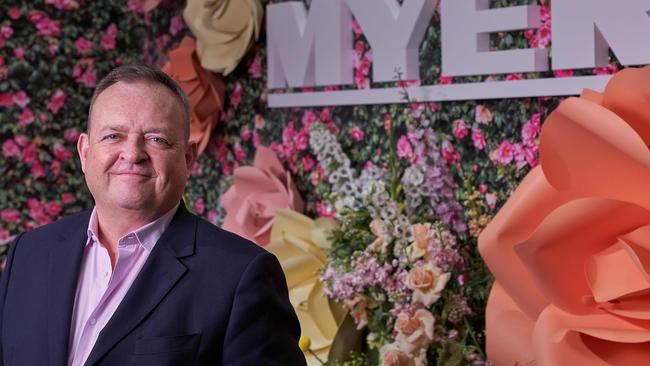What does the future have in store for Myer?
Myer CEO John King predicts a slower economic recovery for Melbourne than other capital cities.

Myer chief executive John King is pulling all the levers he can grab to slash costs, repair a debt-laden balance sheet and accelerate the 120-year old department store’s shift online as he awaits the vaccine rollout he hopes will inject the Australian economy and his shoppers with new-found confidence.
Staring out from his office in Melbourne’s forlorn Docklands on Thursday, where from his seat he said he could see empty office towers where once thousands of workers commuted and spent their money at his nearby CBD store, Mr King said he believed Australia would have a staggered opening “city by city” – but Melbourne was destined for the slowest recovery.
“I think it is city by city, so if I look at Adelaide it is back in positive territory, Perth is there, or thereabouts, Brisbane is a bit slower, Sydney, and so if we look at COVID time the CBDs were down 60-odd per cent, the average is now probably down 30 per cent but Melbourne is still in the 40 per cent to 50 per cent (down) mark,” he said.
“I think Melbourne will be the slowest recovery because I think we have had the harshest lockdowns, and I think the vaccines will bring people back, but not as many, and if I look at our office we are at 50 per cent and we will keep it at that because we can see the benefit from working from home, working from stores and from distribution centres.”
These flagship CBD Myer stores generate about one-third of the retailer’s total earnings. The achingly slow revival of Australia’s CBDs and the return of office workers – the lifeblood of city retailers – out of the COVID-19 pandemic was made brutally clear on Myer’s first-half results released on Tuesday.
Lockdowns and store closures in 2020 inflicted a 32 per cent slump in sales for Myer’s CBD stores for the 26 weeks to January 23, against a 3.1 per cent sales fall across all its store network.
Excluding the Myer CBD stores, comparable store sales would have been up 6.3 per cent, with Myer’s once underperforming regional and suburban stores now champions through COVID-19, with 11 of these stores actually posting sales growth in the half.
Myer reported total revenue down 13.1 per cent to $1.398bn as net profit almost doubled to $43m, up from $24.4m in 2020 when severe writedowns and impairments ravaged its bottom line.
The department store owner said profit before restructuring, clearance floor closures and brand exit costs and impairment of assets was up 8.4 per cent to $42.9m.
It continued strong growth in group online sales, up 71 per cent to $287.6m, representing 21 per cent of total sales and Myer, however its online sales had moderated compared to the second half of 2020 when online sales growth was 98.8 per cent.
Although it maintains headroom in its banking covenants and was net cash positive to the tune of $201.1m, a $98.2m improvement year on year, Myer has continued to suspend its dividends and did not declare an interim dividend.
During the first half Myer took in JobKeeper funds of $50.7m, with $19.1m incurred for payments to eligible employees whose remuneration was lower than the required income threshold under the JobKeeper payment scheme.
Of the JobKeeper funds $32m was paid through subsidised wages. Myer will not pay back JobKeeper and Mr King disputed the link between the wages subsidies and higher profits for retailers that took the government handout.
“It is not as simple as that, you can’t actually just take JobKeeper and rent (reductions) away and equate that to the profit number,” he said.
“If the government hadn’t put JobKeeper in what would have happened to industries around Australia? I think that is a bigger question. What JobKeeper did was keep our team members engaged, allowing them to be connected to the company while we were going through these various lockdowns and then we were able bring them back, open our stores quickly and start trading again.”
Myer also captured rent concessions from its landlords of $15.8m.
Mr King said he believed Myer could return to profitability and pay dividends to shareholders, but it was also waiting on the return of tourism, international students, vaccines and “bloody border closures”.
“International tourism, we are probably talking a year away from that I reckon, at least,” he said. “Interstate tourism is all about these bloody border closures and these politicians politicising border closures, and then you have foreign students; in Melbourne I think only one in seven are back … and then the office workers.”
Mr King is also being frustrated by the interstate border closures. He has not toured his West Australian Myer stores since December 2019.
He is now also pinning hopes on the successful and speedy rollout of vaccines giving the economy an extra kick along and consumers a fresh dose of confidence.
“We need to keep a close eye on consumer confidence over the next six months and then we need to get this vaccine rolled out as well, which will give people further confidence, and I think COVID-19 will become like a flu jab,” he said. “It does give people confidence”
In terms of the Myer results, its cost of doing business was down $86m or 20.9 per cent to $325.2m, although profit margins slid by 55 basis points to 38.6 per cent due in part to lower margin sales and seasonal clearances.
Shares in Myer ended 10.6 per cent down at 29.5c.








To join the conversation, please log in. Don't have an account? Register
Join the conversation, you are commenting as Logout